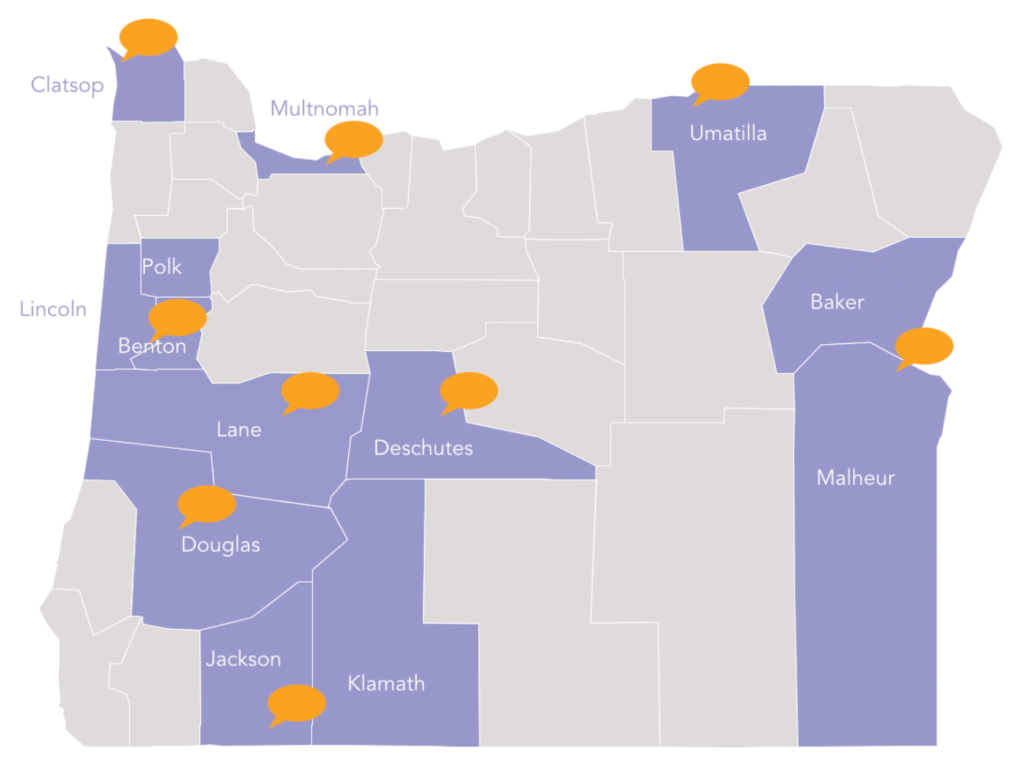2020 Legislative Session: Leading Foundations Propose Regional Workgroups to Plan for Oregon’s Fiscal Future
The public-private partnership will support local civic leaders in developing solutions to address budget shortfalls threatening critical public services
FOR IMMEDIATE RELEASE
February 6, 2020
Caitlin Baggott
(503) 804-7644
caitlin@northstarcivic.org
Salem, Ore.—A group of Oregon foundations including Meyer Memorial Trust, North Star Civic Foundation, Northwest Health Foundation, United Way of the Columbia Willamette, and The Women’s Foundation for Oregon announced a proposal Thursday for a public-private partnership to support the development of community-led solutions to address the state’s structural budget deficit.
The foundations came together in 2019 to form the Oregon Funders’ Fiscal Health & Equity Circle (OFFHEC) to foster the civic knowledge and capacity to address Oregon’s fiscal realities in ways that cultivate trust in civic institutions, build bridges across cultural divides, and lead to equitable solutions supported by data. OFFHEC members invested $300,000 over the past two years to fund economic research and initial engagement with community leaders throughout Oregon.
A statewide collaboration to address Oregon’s fiscal future
OFFHEC is proposing a public-private partnership with the State of Oregon that would support nine regional problem-solving workgroups to identify shared values and develop a menu of solutions to help local jurisdictions navigate two decades of fiscal challenges. Legislators would be invited to participate in a listening tour in late 2020 to meet with each regional work group. The workgroups will then deliver concepts for legislative review in 2021.
A summary of the proposal is available at OurNext20.org/2020proposal.
“What we are proposing today is not a policy, but a process—one that starts with local leaders,” said North Star Civic Foundation Executive Director Caitlin Baggott. “Together, we have an opportunity over the next two years to support local leaders as they work to build bridges across cultural divides and develop equitable solutions.”
Heading off 20 years of budget distress for local governments
Oregon cities, counties, schools and other public services face meaningful budget shortfalls over the next 20 years. During this period, the primary drivers of fiscal stress for local governments are a combination of two things: constrained revenue options to fund local governments and annual increases in required payments to fund the accrued legacy liabilities of the statewide pension system.
In both urban and rural communities, cuts to public budgets tend to result in disproportionate harms to people who are low income, live in areas rural, black, indigenous, and other people of color, people with disabilities and the elderly. And the results of these kinds of budget shortfalls can further distress opportunities for business growth, entrepreneurship and job security, particularly in rural areas.
“Collaboration between the State of Oregon and philanthropic organizations offers a new path forward,” explained Michelle J. DePass, President and CEO of Meyer Memorial Trust.
Supporting civic engagement and advancing solutions through public-private partnership
The OFFHEC proposal includes a request for $500,000 from the State of Oregon to support an eight-month engagement effort for community leaders, building on OFFHEC’s economic research and community engagement. As part of the proposal, the foundations have set a goal to raise an additional $200,000 from partners in philanthropy to support the regional workgroups through 2021.
The program will identify teams of 15 community leaders each in nine regions of Oregon.

Color PAC & Oregon Futures Lab Executive Director Ana del Rocío views this proposal as a necessary step. “By convening local leaders across government and community organizations, we can advance solutions that are rooted in racial justice and our shared hope for the future,” said del Rocío.
OFFHEC’s proposal to create regional fiscal future workgroups has the support of statewide organizations, including the League of Oregon Cities, the Association of Oregon Counties, and the Nonprofit Association of Oregon.
“After decades of ballot measure battles and patchwork approaches to addressing the structural deficit, it’s become clear that the fiscal challenges facing rural communities cannot be solved only in Salem,” said Hermiston Mayor David Drotzmann. “We must engage leaders from local governments, school districts, Tribal communities, and culturally-specific organizations to collectively develop the tools necessary to avoid twenty years of budget crisis. Our future depends on it.”
To learn more about Oregon’s fiscal future and opportunities for collective action, please review our report at www.OurNext20.org.
###
